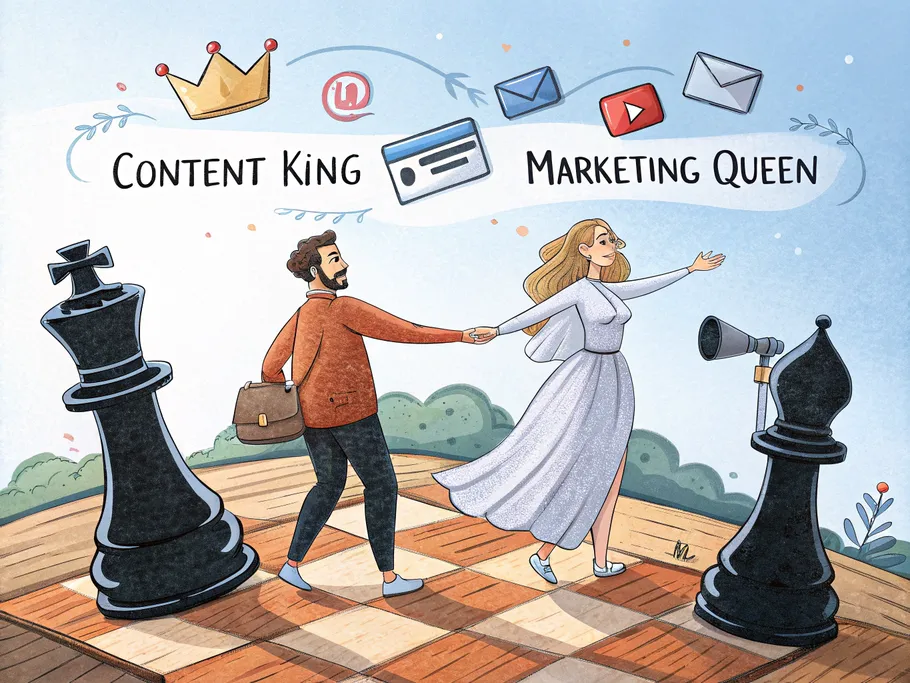After reading this article, you’ll be equipped to skyrocket your content marketing, from start to finish.
I give you LOTS of actionable insights here, as well as some ‘philosophical’ matters you can think about for weeks.

Read the answer carefully, implement every single section, and you’ll have an insanely clear picture of how to go about your content marketing.
Almost nobody does this, and whoever DOES do it – easily wins the ‘creator economy’ game.
Before you post anything, create a living, breathing document about your dream client.
Make it about ONE person, and make it as detailed as possible.
In your content, you’ll want to speak directly to that one person. When you do that, the algorithm has a way of finding thousands of people just like that one.
What do you actually write in this doc?
You don’t have to be a marketing expert to do this. Simply write everything you can think of. I’ll give you some ideas, as well as an example in the fitness niche.
GIve the target audience a name.
(e.g. Steve).
Describe Steve’s pain points in MINUTE detail.
(Steve wants to gain muscle, but no matter how much he eats, he just can’t gain weight. This makes him feel unattractive and insecure. He’s afraid to speak up for himself, and he says he can’t “walk with his chest up”.)
What does his day look like?
(Wakes up, scrolls a little, goes to work, comes home, feels really tired, skips the gym here and there, has no time to make great meals, so he orders in…)
What have they seen and tried before?
(Steve tried eating lots of chicken and rice, but he hated it. It didn’t work, and he quickly started slacking on his diet and eating frozen pizza again. He watches lots of YouTube videos on gaining muscle, but he feels overwhelmed by all the technical nuance).
Who do they want to become?
(Steve wants to be ripped and confident. When someone tries to pick on him, he wants to feel confident in his response. He wants women to notice him, and he wants to feel attractive himself. He wants to be a strong man who can be consistent and proud of his achievements).
What obstacles are standing between him and his ideal scenario?
Firstly, his discipline. If he were more disciplined, he could stick to something long-term. But also, he wants a simple plan he can trust and lean on. If he had ONE source of information, instead of 1000, he could make much faster progress.
Do this for your own target audience, and making content will become much easier. People are never tired of hearing about solutions to their problems.
Get my Startup Launch Roadmap ebook.
That might just be the MOST important step. You’ll learn everything you need to know to build your product or service, launch, attract investments, and scale to the moon. You can get it here:

I want you to completely forget about likes… and even views.
Don’t even check those. Don’t check your subscribers. None of that matters.
A piece of content should be judged on its success in moving the viewer closer to a purchase. The most important metric is the number of people who take action (click a link or buy a program), not how many people liked the piece.
When you have this lens, your content looks much different.
Let me illustrate it…
If you optimized for views, you would make HYPER-edited videos without much substance. But those videos would NOT get you sales!
The content marketing that makes sales is content that gains trust. It’s that unedited 40-minute guide that will make people buy your program.
I talked about this in my Full Guide To Blogging Article. To quote myself…
People want proof.
They want to see that you’ve thought about this deeply. That you know what you’re doing.
That you’re not just repeating ideas you saw on LinkedIn this morning.
I don’t know if you’ve noticed, but there are SO many YouTube channels with like 2000 subs putting out these 40-minute full-guide videos.
And somehow… they still sell countless $5000 programs.
And those videos DON’T pull in tons of views!
These ‘full guides’ actually build trust. They answer objections before they’re even fully formed in the viewer’s mind.
If you optimize for views, you’ll create content for ‘buddies’.
They want you to be relatable and goofy. These are the people who comment “We got this video before GTA 6!!!” on your videos.
It’s the people who comment “he’s selling out, he just cares about money”.
You know what? It’s the people who comment altogether.
Buyers don’t leave random comments on social media posts.
DO NOT listen to what they say. They won’t take action and buy anyway.
The buyers, on the other hand – don’t want you to be relatable and entertaining. They want you to lead.
They WANT you to start every video with Stripe dashboard screenshots, so they see you’re legit. A buddy will call you ‘arrogant’ for doing that.
Buyers want you to position yourself as above them. They want to know that they’ll grow if they follow your advice. They WANT you to dress fancy on videos. A buddy will mock you for it.
And the best thing is… a buyer will never give you feedback until they buy. Listen to buyers, not buddies, okay, buddy?
If you lead with results, you’ll never have to ‘convince’ people. It’s how all these high-ticket programs get sold.

Start extremely simple.
I recommend you choose just one traffic source (e.g. YouTube/Instagram) and add complexity LATER.
Make a product, and link a sales page to it.
It’s that easy. Then, all you have to do is focus on creating amazing content.
You can build a six-figure business from a single Instagram account or YouTube channel. After you master one source and you want to add more complexity – go ahead.
Add email marketing, add some upsells, ads, etc.
But at the beginning, make it stupidly simple. Start slow to go fast.
This tactic is absolute gold.
You don’t need to reinvent everything. Hell, you don’t need to reinvent ANYTHING when it comes to your content.
Here’s an extremely actionable guide.
This tactic ALONE will help you massively grow your business.
No need to reinvent the wheel or be smart while you’re still small.
You can easily grow to 100K+ just by ‘copying’ other people.
In school, we were taught that copying is bad, but I want you to change that mindset (if you want to grow a successful business).
Copying is AMAZING, as long as you still use your examples and personality.
A content pillar is simply a fancy name for the much simpler term “theme.”
For example, a content pillar can be “debunking weight loss myths”.
Good news! You can also copy this from other people 😀
My advice is to pick 2-3 pillars and stay consistent.
Some more ideas for you…
This will require a bit of testing, but when you find something that works for you, do NOT switch it up.
As soon as people find something that works, they tend to think “Oh, cool! But now, people have already seen it, and I need a new idea.”
Not really.
Even if you go massively viral, most people on Earth have not seen your content. I can guarantee that.
Change up the angle, and make 10 more posts about the same thing. When something works, milk it.
This is how you become known for something.

After you’ve mastered the fundamentals, start repurposing your content.
Your long form content can easily be chopped up into short form.
Your YouTube videos can become YT Shorts and Instagram Reels. Your blog posts can serve as email fodder, or also be made into scripts for Instagram Reels.
There are countless AIs that can chop up your videos and package them into shorts. Don’t spend hours and hours doing this yourself.
Either find an AI, or find a cheap freelancer. This is not a high-end task, so it shouldn’t cost you too much.
I want you to deeply ponder on the following question…
Who are you fighting against on behalf of your audience?
When you and your audience have a common enemy and you’re fighting that enemy for the sake of everyone, you’ll be perceived as a leader.
It’s what every cult leader in history did – and they had lots of influence.
I want you to be the same (minus all the cruel and downright weird stuff…)
You can rally people much more easily if you have a common enemy. A ‘villain’ can be something like big pharma, big banks screwing over the common man, shady marketers, etc.
Regularly mention them in your content and position yourself as the voice of truth.
Buyers love this.
Content marketing really isn’t about going viral. Just think about turning attention into action.
If you keep things simple and focus on the right things, you don’t need a big budget to get real results.

Email subscription is available ONLY TODAY (oh, okay, and tomorrow).
Surely, we respect your inbox! Unsubscription works every day.

We’d love to tailor your experience — which of these best describes you?